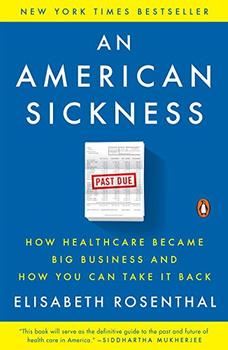Summary | Excerpt | Reviews | Beyond the Book | Readalikes | Genres & Themes | Author Bio
How Healthcare Became Big Business and How You Can Take It Back

Critics' Opinion:
Readers' Opinion:
First Published:
Apr 2017, 416 pages
Paperback:
Mar 2018, 432 pages
 Book Reviewed by:
Book Reviewed by:
Kim Kovacs
Buy This Book
Where is all that money going?
Before becoming a reporter for the New York Times, I went to Harvard Medical School and then trained and worked as a physician at what is now New York Presbyterian Medical Center, a prestigious academic hospital. To explore the American system and its ills, I've fallen back on the "history and physical," an organized and disciplined form of record keeping that every doctor uses. The so-called H&P is a remarkable template for understanding complex problems, such as sorting out a patient's complicated multitude of symptoms, in order to come to the proper diagnosis and to allow for effective treatment. The H&P has predictable components:
What you are reading right now is the chief complaint: hugely expensive medical care that doesn't reliably deliver quality results. Part 1 of this book, "History of the Present Illness and Review of Systems," charts the transformation of American medicine in the last quarter century from a caring endeavor to the most profitable industry in the United States—what many experts refer to as a medical-industrial complex. As money became the metric of good medicine, everyone wanted more and cared less about their original mission. The descent happened sector by sector: insurers, then hospitals, doctors, pharmaceutical manufacturers, and so on.
First as the child of an old-fashioned doctor––my father was a hematologist—then as an MD, and finally during my years as a healthcare reporter for the Times, I've had a lifetime front-row seat to the slow-moving heist. I have spent months poring over financial statements, tax documents, patient charts, and bills trying to explain why, for example, a test that costs $1,000 at one of the nation's leading academic hospitals costs $7,000 at some small community hospitals in New Jersey—and the equivalent of only about $100 in Germany and Japan.
These days our treatment follows not scientific guidelines, but the logic of commerce in an imperfect and unregulated market, whose big players spend more on lobbying than defense contractors. Financial incentives to order more and do more—to default to the most expensive treatment for whatever ails you—drive much of our healthcare. The central mantra of "innovation" in the past decade has been "patient-centered, evidence-based care." But isn't that the very essence of medicine? What other kind of medical care could there be?
All the harrowing tales in this book occurred despite the 2010 passage and 2014 enactment of the Patient Protection and Affordable Care Act (the ACA, also known as "Obamacare"). The ACA is not a failure, as some still assert, but the "affordable" in its name was an overreach to win over votes and public opinion. (Healthcare bills all have happy names affixed for the sell, including the newest mixed bag, the 21st Century Cures Act.) After endless compromises with the medical industry to enable its passage, the ACA was mostly a bill to make sure that every American could have access to health insurance. But it didn't directly do much, if anything, to control runaway spending or unsavory business practices. Washington being what it is I doubt we'll ever see the "Take Back America's Healthcare" bill or the "Stop Robbing Patients" bill.
It is easy to feel helpless. Our sense of medical urgency combined with bureaucratic confusion is a debilitating cocktail. But we, the patients, can actually do a lot to wrest control of our health from the ledgers of the medical-industrial complex.
From An American Sickness by Elisabeth Rosenthal. Reprinted by arrangement with Penguin Press, a member of Penguin Group (USA) LLC, A Penguin Random House Company. Copyright © Elisabeth Rosenthal, 2017.





The House on Biscayne Bay
by Chanel Cleeton
As death stalks a gothic mansion in Miami, the lives of two women intertwine as the past and present collide.

The Flower Sisters
by Michelle Collins Anderson
From the new Fannie Flagg of the Ozarks, a richly-woven story of family, forgiveness, and reinvention.

The Funeral Cryer by Wenyan Lu
Debut novelist Wenyan Lu brings us this witty yet profound story about one woman's midlife reawakening in contemporary rural China.
Your guide toexceptional books
BookBrowse seeks out and recommends the best in contemporary fiction and nonfiction—books that not only engage and entertain but also deepen our understanding of ourselves and the world around us.